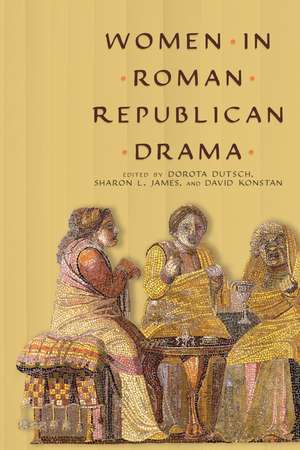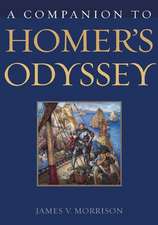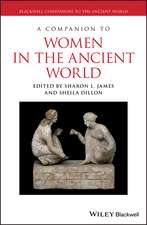Women in Roman Republican Drama: Wisconsin Studies in Classics
Editat de Dorota Dutsch, Sharon L. James, David Konstanen Limba Engleză Paperback – 26 apr 2015
Latin plays were written for audiences whose gender perspectives and expectations were shaped by life in Rome, and the crowds watching the plays included both female citizens and female slaves. Relationships between men and women, ideas of masculinity and femininity, the stock characters of dowered wife and of prostitute—all of these are frequently staged in Roman tragedies and comedies. This is the first book to confront directly the role of women in Roman Republican plays of all genres, as well as to examine the role of gender in the influence of this tradition on later dramatists from Shakespeare to Sondheim.
Din seria Wisconsin Studies in Classics
-
 Preț: 71.93 lei
Preț: 71.93 lei -
 Preț: 357.07 lei
Preț: 357.07 lei -
 Preț: 160.09 lei
Preț: 160.09 lei -
 Preț: 321.58 lei
Preț: 321.58 lei -
 Preț: 116.93 lei
Preț: 116.93 lei -
 Preț: 58.57 lei
Preț: 58.57 lei -
 Preț: 208.26 lei
Preț: 208.26 lei -
 Preț: 238.93 lei
Preț: 238.93 lei -
 Preț: 322.99 lei
Preț: 322.99 lei -
 Preț: 403.33 lei
Preț: 403.33 lei -
 Preț: 149.95 lei
Preț: 149.95 lei -
 Preț: 66.23 lei
Preț: 66.23 lei -
 Preț: 118.67 lei
Preț: 118.67 lei -
 Preț: 306.60 lei
Preț: 306.60 lei -
 Preț: 229.03 lei
Preț: 229.03 lei -
 Preț: 310.57 lei
Preț: 310.57 lei -
 Preț: 336.39 lei
Preț: 336.39 lei -
 Preț: 258.86 lei
Preț: 258.86 lei -
 Preț: 153.95 lei
Preț: 153.95 lei -
 Preț: 429.75 lei
Preț: 429.75 lei -
 Preț: 227.80 lei
Preț: 227.80 lei -
 Preț: 506.04 lei
Preț: 506.04 lei - 15%
 Preț: 478.78 lei
Preț: 478.78 lei -
 Preț: 247.73 lei
Preț: 247.73 lei -
 Preț: 402.76 lei
Preț: 402.76 lei - 15%
 Preț: 476.54 lei
Preț: 476.54 lei -
 Preț: 178.13 lei
Preț: 178.13 lei -
 Preț: 257.29 lei
Preț: 257.29 lei -
 Preț: 119.03 lei
Preț: 119.03 lei -
 Preț: 166.72 lei
Preț: 166.72 lei -
 Preț: 187.37 lei
Preț: 187.37 lei -
 Preț: 199.67 lei
Preț: 199.67 lei -
 Preț: 218.12 lei
Preț: 218.12 lei - 23%
 Preț: 608.98 lei
Preț: 608.98 lei - 23%
 Preț: 589.87 lei
Preț: 589.87 lei -
 Preț: 347.37 lei
Preț: 347.37 lei -
 Preț: 305.89 lei
Preț: 305.89 lei -
 Preț: 122.89 lei
Preț: 122.89 lei -
 Preț: 177.37 lei
Preț: 177.37 lei - 23%
 Preț: 591.20 lei
Preț: 591.20 lei -
 Preț: 160.48 lei
Preț: 160.48 lei -
 Preț: 258.14 lei
Preț: 258.14 lei -
 Preț: 258.25 lei
Preț: 258.25 lei - 23%
 Preț: 450.63 lei
Preț: 450.63 lei - 23%
 Preț: 709.57 lei
Preț: 709.57 lei -
 Preț: 502.03 lei
Preț: 502.03 lei -
 Preț: 246.80 lei
Preț: 246.80 lei
Preț: 428.40 lei
Nou
Puncte Express: 643
Preț estimativ în valută:
81.97€ • 85.82$ • 67.83£
81.97€ • 85.82$ • 67.83£
Carte tipărită la comandă
Livrare economică 05-19 aprilie
Preluare comenzi: 021 569.72.76
Specificații
ISBN-13: 9780299303143
ISBN-10: 0299303144
Pagini: 272
Dimensiuni: 152 x 229 x 18 mm
Greutate: 0.41 kg
Ediția:1
Editura: University of Wisconsin Press
Colecția University of Wisconsin Press
Seria Wisconsin Studies in Classics
ISBN-10: 0299303144
Pagini: 272
Dimensiuni: 152 x 229 x 18 mm
Greutate: 0.41 kg
Ediția:1
Editura: University of Wisconsin Press
Colecția University of Wisconsin Press
Seria Wisconsin Studies in Classics
Recenzii
“This is an important and much-needed study that weaves together new trends in understanding gender roles in Roman Republican drama. It offers new theoretical insights for performance and theater studies and presents an impressive spectrum of topics that will guide any scholar and student of Roman theater and anyone interested in the literary representations and lives of women in antiquity.”—Andromache Karanika, University of California, Irvine
“An indispensable resource for students of Roman drama and also important for those in theater and drama and women’s studies. Recommended. Lower-division undergraduates and above.”—Choice
“An outstanding collection of essays, illuminating how female slaves and citizens were centre stage in Roman Republican drama, and it will serve as an invaluable resource for students and teachers of Roman drama.”—The Classical Review
Notă biografică
Dorota Dutsch is an associate professor of classics at University of California, Santa Barbara, and the author of Feminine Discourse in Roman Comedy. Sharon L. James is an associate professor of classics at the University of North Carolina at Chapel Hill. The author of Learned Girls and Male Persuasion, she also has a YouTube channel (Sharon James) of scenes from Roman dramas. David Konstan is a professor of classics at New York University and the author of many books, including Roman Comedy and Greek Comedy and Ideology.
Cuprins
Introduction
Dorota Dutsch, Sharon L. James, and David Konstan
Part One: Females in Performance
Feats of Flesh: The Female Body on the Plautine Stage
Dorota Dutsch
Slave-Woman Drag
Amy Richlin
Music and Gender in Terence's Hecyra
Timothy J. Moore
Part Two: Women in Roman Drama and Society
Women in Control
Elaine Fantham
Mater, Oratio, Filia: Listening to Mothers in Roman Comedy
Sharon L. James
The Many Shapes of Sisterhood in Roman Comedy
Anne Feltovich
Roman Women in the Fabula Togata
Jarrett Welsh
Haut facul . . . femina una invenitur bona? Representations of Women in Republican Tragedy
Gesine Manuwald
Part Three: Receptions
Machiavelli's Mandragola and the Logic of Seduction
Valeria Cinaglia and David Konstan
Shakespeare and the Roman Comic Meretrix
Ariana Traill
Juno's Triumph in Antônio José da Silva's Anfitrião ou Júpiter e Alcmena
Rodrigo Tadeu Gonçalves
Contributors
Index
Dorota Dutsch, Sharon L. James, and David Konstan
Part One: Females in Performance
Feats of Flesh: The Female Body on the Plautine Stage
Dorota Dutsch
Slave-Woman Drag
Amy Richlin
Music and Gender in Terence's Hecyra
Timothy J. Moore
Part Two: Women in Roman Drama and Society
Women in Control
Elaine Fantham
Mater, Oratio, Filia: Listening to Mothers in Roman Comedy
Sharon L. James
The Many Shapes of Sisterhood in Roman Comedy
Anne Feltovich
Roman Women in the Fabula Togata
Jarrett Welsh
Haut facul . . . femina una invenitur bona? Representations of Women in Republican Tragedy
Gesine Manuwald
Part Three: Receptions
Machiavelli's Mandragola and the Logic of Seduction
Valeria Cinaglia and David Konstan
Shakespeare and the Roman Comic Meretrix
Ariana Traill
Juno's Triumph in Antônio José da Silva's Anfitrião ou Júpiter e Alcmena
Rodrigo Tadeu Gonçalves
Contributors
Index
Descriere
This is the first book to confront directly the role of women in Roman plays of all genres, as well as to examine gender in the influence of this tradition on later dramatists from Shakespeare to Sondheim.















